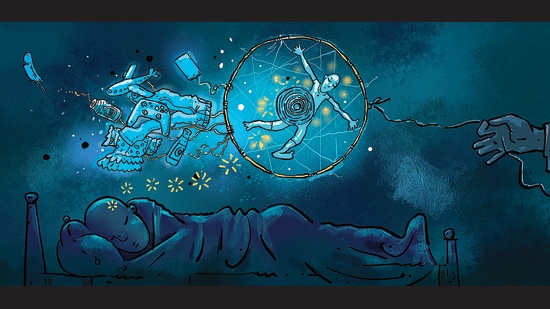Wake-up call: Can ads creep into your dreams?
Advertisers are coming for your subconscious, with audio and video aimed to trigger your mind as you sleep. Scientists are already sounding the alarm
The final frontier for advertising, sleep, is being breached. A technique called dream incubation, earlier used with rather uncertain success to help people build up their confidence, quit a bad habit or learn a new language faster, is now being used to market products.

Dream incubation is a practice that employs images, sounds and other sensory cues to shape a person’s night-time thoughts. In a famous example, the smell of smoke and rotten eggs delivered together into a room where subjects slept was, in some cases, found to have helped them kick the butt.
In its new form, brands would use similar techniques to turn dreamscapes into billboards. This January, the US-based beer conglomerate Molson Coors launched an ad campaign that announced that it would use Targeted Dream Incubation (TDI) to subliminally impact the dreams of millions of TV viewers, a night before the Super Bowl.
Molson Coors worked with Deirdre Barrett, a psychologist and dream researcher who teaches at Harvard Medical School. The ad contained imagery designed to resurface in sleep and create positive dreams of Coors beer. It featured calming music, water, bright blues, and the Coors logo, and was followed by eight hours of dream incubation audio.
The goal was to get at least a small share of viewers to associate the brand with a refreshing, positive mood, and reach for a chilled Coors while watching the much-anticipated game the following day.
The commercial ran on the company’s website (Coors can’t get a Super Bowl TVC slot for reasons that involve the NFL and its deal with beer brand Budweiser). It created some buzz for Coors around what is arguably the US’s largest TV event. And before the Super Bowl, Coors said it conducted a mini-experiment where 18 people watched the video just before they went to sleep. An eight-hour soundscape played while they slept. Five participants apparently reported Coors dreams.
But it felt so real
Regardless of whether the Coors campaign was gimmick, pseudo-science or just partially effective, the ad alarmed scientists from Harvard, MIT and the Paris Brain Institute so much that, in June, about 40 scientists co-authored an opinion piece on the open-source platform PubPub, warning readers of the dangers inherent in advertising through TDI. Adam Haar Horowitz, a researcher at MIT Media Lab, was one of the co-authors.
The sleep state that TDI targets, hypnagogia,Haar says, is a state of semi-lucidity or semi-wakefulness “where people are in the process of descending into unconsciousness, partially awake”. “They are losing awareness, but they maintain hearing and feeling. This means they have less cognitive control, more fluid thinking, and are more suggestible than a fully awake individual — but can still hear their sleeping environment clearly, unlike in later NREM and REM sleep,” Haar says. “And so, when we play audio suggestions (‘Think of Hawaii’) their brain readily conjures up that image and creates a dream narrative around it.”
Haar offers a hypothetical example of how this could affect the sleeping consumer in alarming ways. There are currently numerous home automation systems that offer sleep soundtracks made up of soothing sounds like ocean waves. Now imagine that among them is one that contains advertising messaging, say for a luxury cruise line.
“As you slept, it would mix into the sounds of waves the brand name and words like ‘Cruise’ and ‘Peaceful’,” says Haar. “The next day, your online ads would likely be for cruise tours. And you may not even know why.”
Studies have shown, Haar adds, that audio suggestions during a nap can change a consumer’s choice of post-nap snack. “Subjects were often unaware of the sleep or dream hacking they experienced. Additionally, interventions that failed to change consumer behaviour when awake were found to be effective if delivered during sleep. Dreams can alter waking emotion, and alter emotional associations with daytime experiences or memories, and dream hacking can change the emotional tone of dreams, in turn changing associations with what we encounter in wake. The reason for creating protections around strategies to influence individuals while they sleep is because we are uniquely vulnerable in sleep.”
The real reason to sound the alarm so early, Haar says, is so that you do not sound the alarm too late. “It would have been wonderful if psychologists who study reward and addiction would have said clearly that their research could create deeply addictive social media before it had infiltrated billions of minds — that alarm was sounded too late. Responsible legislation which is clear about informed consent and what constitutes deceitful practice of dream incubation is needed before it is a common practice, not after.”
Sleep over it
Would you pay to have your dreams altered? Last year, Microsoft promoted its Xbox Series X console through what the company called a dream incubation experiment. Play on the Series X, it suggested, and even your dreams will become more interesting.
The ad consisted of a short film created by Academy Award-winner Taika Waititi (Jojo Rabbit), with footage that claimed to represent the dreams of gamers after they played on the Series X for the first time.
The clips are full of surreal imagery such as space scenes and floating whales made of light, as well as Xbox-inspired icons.
Gamer Krystal Holmes aka MoonLiteWolf apparently encountered the whale, a space party, and the Xbox game Halo’s Master Chief, DJ-ing.
All Access.
One Subscription.
Get 360° coverage—from daily headlines
to 100 year archives.



HT App & Website






